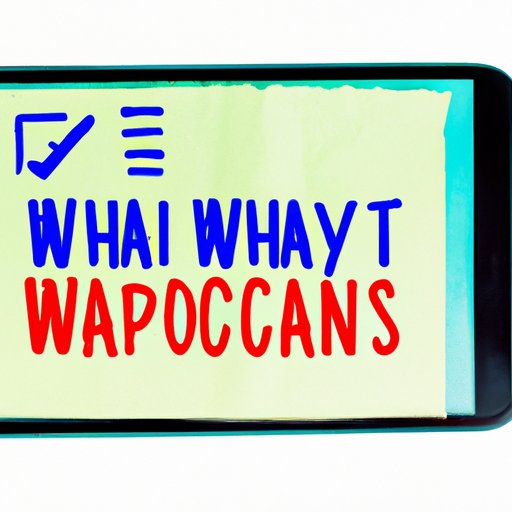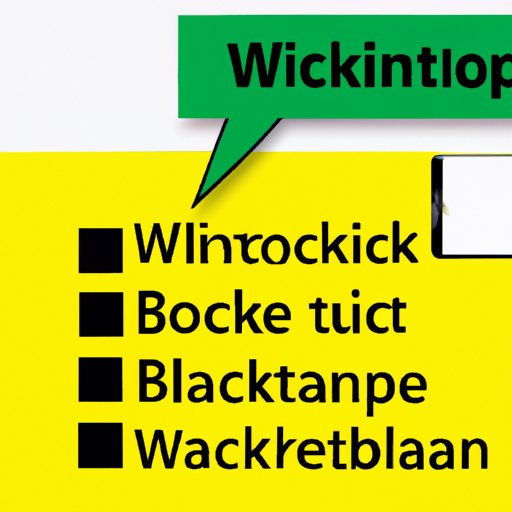
Introduction
One of the most convenient and widespread communication apps, WhatsApp, allows its users to connect with others from all over the world. However, sometimes it becomes necessary to put up a boundary between yourself and someone who is causing distress or discomfort on the app. The block feature on WhatsApp can provide a way to protect oneself, but it also raises questions about its emotional, ethical, and practical implications. This article aims to explore what happens when you block someone on WhatsApp, discussing the technical process, emotional impact, ethical considerations, potential consequences, social norms, and alternatives to blocking.
The Technical Process Behind Blocking Someone on WhatsApp
If you want to block someone on WhatsApp, the process is simple:
- Open WhatsApp and go to the chats tab
- Find the chat with the person you want to block
- Tap and hold on the chat until a menu of options appears
- Select ‘Block’ and confirm your decision
Once you have blocked someone on WhatsApp, they will not receive any notifications about your activity on the app or your status updates. All your previous messages, calls, and updates will stop reaching them, and they will similarly be unable to message, call, or see your status on WhatsApp.
If someone has blocked you on WhatsApp, you will not be able to see their profile picture, last seen status, or online status. When you try to message them, you will see only one grey tick instead of green or blue, which means your message has not been delivered.
The Emotional Impact of Blocking Someone on WhatsApp
There are different motivations behind blocking someone on WhatsApp, ranging from stopping bullying, trolling, or harassment to avoiding an awkward acquaintance or a complex situation. Whatever the reasons, blocking someone can have an impact on both parties.
For the person who blocks someone, it can feel empowering and liberating to regain control over one’s digital life, especially if they were feeling overwhelmed or threatened. Some also use blocking as a way to cope with rejection or disappointment, giving themselves a sense of closure and protection.
However, blocking can also create negative feelings, such as guilt, regret, or fear of retaliation. The act of blocking cuts off communication and can be seen as a harsh rejection, leading to hurt feelings, anger, and resentment. Even if a person decides to block someone in self-defense, they might still feel anxious about whether the other person is trying to contact them or what their reaction might be.
For the person who is being blocked, the experience can be confusing and hurtful, especially if they were not expecting it or aware of the reason. Being blocked can make someone feel rejected, isolated, and powerless, leading to self-doubt, anger, or depression. Being unable to understand the other person’s motives or to respond to their messages can increase the sense of frustration and undermine the trust that was built in the past.
Ultimately, the emotional impact of blocking someone on WhatsApp depends on the context, the severity of the situation, and the personalities and expectations of the individuals involved.
The Ethical Considerations of Blocking Someone on WhatsApp
While blocking someone on WhatsApp can provide temporary relief or protection, it also raises ethical questions about the balance between individual freedom and communal responsibility.
On one hand, blocking can be seen as a way to assert one’s boundaries and autonomy, especially if the other person’s behavior is harmful, intrusive, or disrespectful. By blocking someone, a person can protect their mental health, privacy, and safety, and prevent further damage.
On the other hand, blocking can be interpreted as a way to avoid confrontation, responsibility, or compassion towards others who might be struggling or in need. By blocking someone, a person can shut down communication and potentially harm the other person’s mental health, social support, or sense of belonging.
Therefore, the decision to block someone on WhatsApp should take into account the potential consequences and alternatives. It is important to assess the severity of the situation, the urgency of the need, and the likelihood of a positive outcome if a different approach is taken.
The Potential Consequences of Blocking Someone on WhatsApp
Blocking someone on WhatsApp can have unintended consequences that might exacerbate the original problem or create new ones.
For example, if someone is being bullied or harassed on WhatsApp, blocking the person might stop the direct attacks, but it might also drive the attacker to escalate the aggression on other platforms or in real life. Similarly, if someone blocks a relative who is being pushy or invasive, it might lead to a family feud or further alienation.
In addition, blocking someone on WhatsApp can cause misunderstandings, miscommunication, or confusion, especially if the other person was not aware of any issue. It might also affect group chats, where blocking one person might disrupt the dynamics and spoil the atmosphere.
Therefore, it is important to consider the wider implications of blocking someone on WhatsApp and to weigh the options carefully before taking action.
The Practical Implications of Blocking Someone on WhatsApp
When you block someone on WhatsApp, your chat history with that person will be deleted from your phone, and you will no longer be able to see their chat history or status updates. However, if you have backed up your WhatsApp chats, the blocked person’s messages will still appear in your back-up copy.
When you block someone on WhatsApp, they will not be notified about it explicitly, but they might notice some changes in their app, such as not seeing your updates or not being able to view your profile picture. They might also deduce that they have been blocked if they send you messages and see only one grey tick instead of two.
If you want to unblock someone on WhatsApp, you can follow these steps:
- Open WhatsApp and tap on the three dots in the top right corner
- Select ‘Settings’ and then ‘Account’
- Tap on ‘Privacy’ and then ‘Blocked contacts’
- Select the person you want to unblock and tap on ‘Unblock’
- Confirm your decision
After unblocking someone on WhatsApp, you will have to add them as a contact again and start a new chat if you wish to communicate with them. Your previous chat history with that person will not be restored.
The Social Norms Around Blocking Someone on WhatsApp
The attitude towards blocking someone on WhatsApp varies depending on cultural, social, and generational factors.
In some cultures, blocking is seen as a last resort and a sign of extreme disrespect or hostility. In others, blocking is more common and accepted as a way to manage conflicts or avoid awkward situations. In some social groups, blocking is seen as an ethical or moral obligation to protect oneself and one’s peers from harm. In others, blocking is seen as a personal preference and a right to communicate only with whom one chooses.
The rise of social media has also contributed to changing social norms around blocking, as people have more tools and options to curate their online presence and avoid unwanted attention. However, it has also created new forms of miscommunication, misunderstanding, and polarization, as blocking can amplify the echo chamber effect and prevent diverse voices from being heard.

Alternatives to Blocking Someone on WhatsApp
Blocking someone on WhatsApp is not the only option when facing difficult or inappropriate behavior. Other alternatives include:
- Muting someone’s notifications
- Reporting someone’s behavior to WhatsApp support
- Having a honest conversation with the person about your concerns
- Setting clear boundaries and expectations for your communication
- Choosing to take a break from the app or reduce your usage
- Seeking professional support or counseling if necessary
While these alternatives might not always work and might require more effort or courage, they can provide a more thoughtful and compassionate way to deal with difficult situations, while preserving one’s dignity and respect towards oneself and others.
Conclusion
Blocking someone on WhatsApp is a common feature that can provide a sense of control and protection, but it also raises questions about its emotional, ethical, and practical implications. By discussing the technical process, emotional impact, ethical considerations, potential consequences, social norms, and alternatives to blocking on WhatsApp, this article has aimed to provide a nuanced perspective on the issue. Ultimately, the decision to block someone on WhatsApp should be guided by a balance between self-care and communal responsibility, and should take into account the wider context and consequences of the action.





